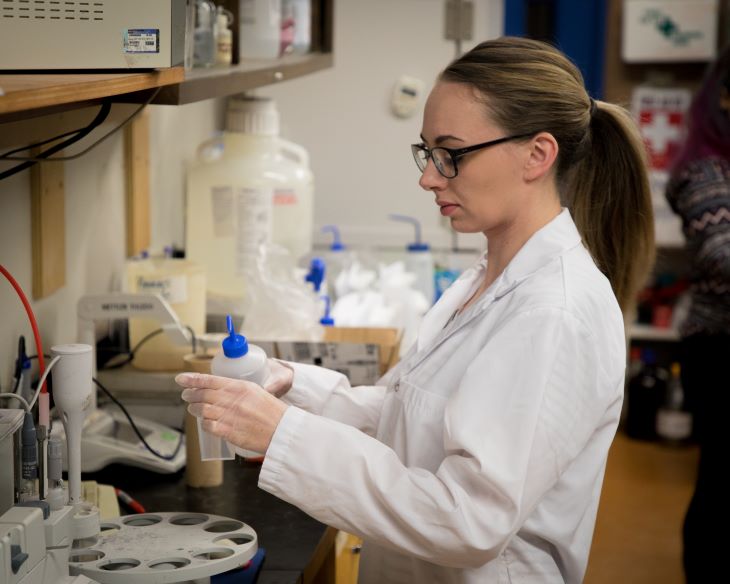Lakehead University Environmental Laboratory
Introduction and History
Established in 1995, the Environmental Laboratory (LUEL) offers multi-parameter testing of soils, sediments, biological tissues, vegetation, waters and specific chemicals. LUEL demonstrated  proficiency in water chemistry, toxicology, and specific testing of biological samples; accredited to ISO 17025 by the Canadian Association for Laboratory Accreditation (www.cala.ca for scope of tests). LUEL facilitates research and development in Northwestern Ontario through its partnerships, field investigations of water quality and wetlands, environmental monitoring, and commitment to students’ research and development.
proficiency in water chemistry, toxicology, and specific testing of biological samples; accredited to ISO 17025 by the Canadian Association for Laboratory Accreditation (www.cala.ca for scope of tests). LUEL facilitates research and development in Northwestern Ontario through its partnerships, field investigations of water quality and wetlands, environmental monitoring, and commitment to students’ research and development.
The Lakehead University Environmental Laboratory had its start as the laboratory responsible for supporting the Lakehead University Wild Rice Research and Extension Program sponsored originally by the Ontario Ministry of Northern Affairs. Later, additional funding was provided by Indian and Northern Affairs Canada. This program ran from 1981 until 1995. The lab was known as the Soils Laboratory and analyzed hundreds of sediment samples collected from lakes either growing wild rice or being considered for seeding wild rice. Plant tissue was also extensively analyzed and used to provide recommendations for wild rice production enhancement. The lab had summer field crews looking at potential wild rice lakes across the province. There was close association with First Nations and, in particular, the Ontario Indian Wild Rice Development Agency headed by Mr. Archie Potson of the Seine River First Nation (SRFN). LUEL still works closely with Seine River. It is of interest that the Current Chief of SRFN, Chief Tom Johnson, and Councillor John Kabatay are the nephews of Archie Potson who was himself a Chief and Councillor of SRFN.
During this time period, the lab was involved in a number of projects dealing with wetland remediation with various government agencies and mining companies. Projects at Lakehead continue today on both wild rice and wetlands.
The Lakehead University Environmental Laboratory (LUEL) operates and implements the ISO17025 accredited Quality Assurance Management system. LUEL manages two multi-part facilities; the analytical chemistry laboratory (LUEL) and the toxicology testing laboratory (ATRC).
The laboratory demonstrates proficiency through participation in Interlaboratory Study with The Canadian Association of Laboratory Accreditation (CALA), the National Water Research Institute (NWRI) and Brooks Rand Labs (USA). Interlaboratory Studies are part of the Proficiency Testing Program. Principles are followed to ensure the reliability of results and consist of guidelines, procedures and practices developed and implemented to produce quality data.
Office Information
Location: University Centre (UC 0001)
Phone: 807-343-8010 ext 8368
If you have any questions regarding how we can serve you, please feel free to call the laboratory.
The Lakehead University Environmental Laboratory offers chemical analysis of soils, foliage, water and wastewaters. The laboratory supports both teaching and research at Lakehead University, offering access to production based analytical methods. The laboratory demonstrates proficiency through the National Contaminant Proficiency program. Clients can be assured of accurate results because the laboratory is accredited to ISO 17025 for total suspended solids in water (see cala.ca for a complete scope).







